On this week’s edition of The Goggler Pull List, we review and recommend Curt Pires’ Wyrd and Tom King’s Supergirl: Woman of Tomorrow.
Check it out.
Wyrd (Curt Pires and Antonio Fuso)

Wyrd was one of those comics I picked up on a whim. The description sounded interesting, and being only four issues, I thought it was worth picking up, even if just for the hell of it.
There are problems, cases, too strange for U.S. law enforcement to solve. Pitor Wyrd is the one who solves them – for a fee, of course.
Wyrd, Dark Horse Comics
Wyrd is a wild and weird comic. It never quite feels like it settles and is just a little bit disconcerting to read. Over the course of these four issues, we follow Pitor Wyrd as we get a glimpse into his past, his present, and his future, sometimes in the same issue, sometimes for just one page.
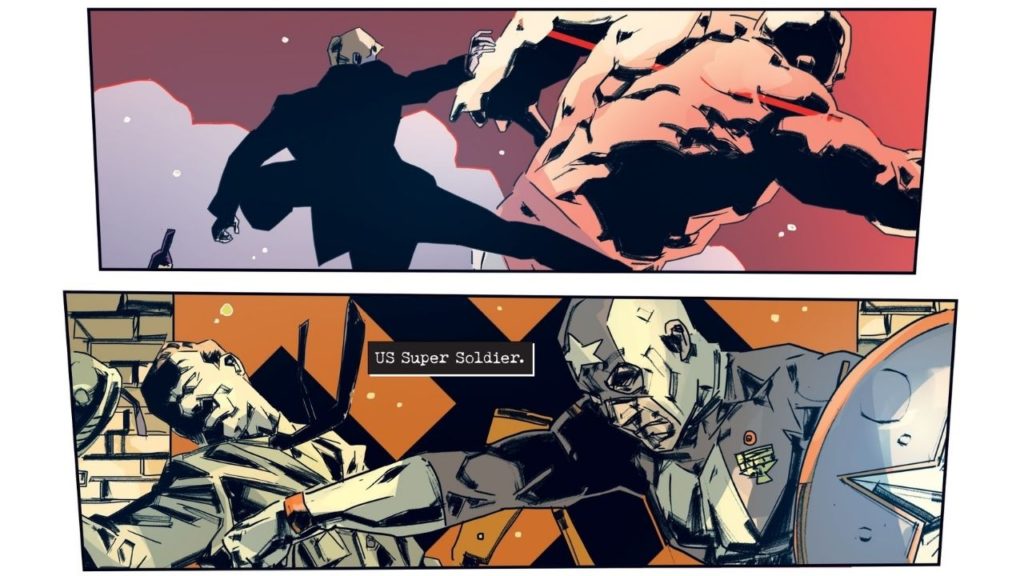
The art is erratic in style, differing from each case/adventure Wyrd goes on. But it all feels like one piece of the story of Pitor Wyrd, an invincible agent of the U.S. government, who numbs his pain by constantly drinking and leaping without looking.
These four issues don’t break down too much of Pitor Wyrd’s backstory, but it does a whole lot in building a world that is interesting. From infiltrating Crimea to stop a failed attempt at recreating a certain super soldier, to visiting a secret city deep in the Arizona desert, as well as a red caped boy held in a military institution in Kansas, Wyrd takes the reader on these crazy adventures to meet characters that may or may not be familiar.
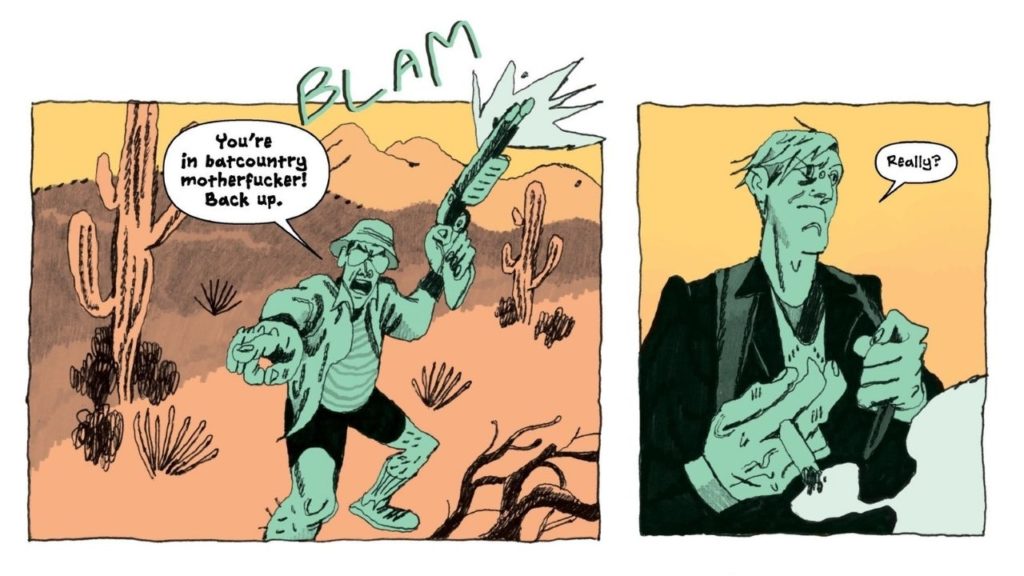
Late last year it was announced that Matthew Rhys will be remaking Wyrd for TV and it struck me as an odd choice for a serialized story. Unlike say Brian K. Vaughn’s Y: The Last Man, Wyrd doesn’t have 60 issues of a story to tell. Wyrd doesn’t have the one story of a man trying to make it in a world where all other men have died. I was wrong. After rereading these four issues again, Wyrd makes perfect sense for a TV show.
The world of Wyrd is perfect for the serialised episodic format. The world built by Curt Pires and Antonio Fuso is ripe for TV. Pitor Wyrd is Fox Mulder and John Constantine rolled into one. A jaded believer of the unexplained working for the shady secretive side of the U.S. government. There is definitely potential there.
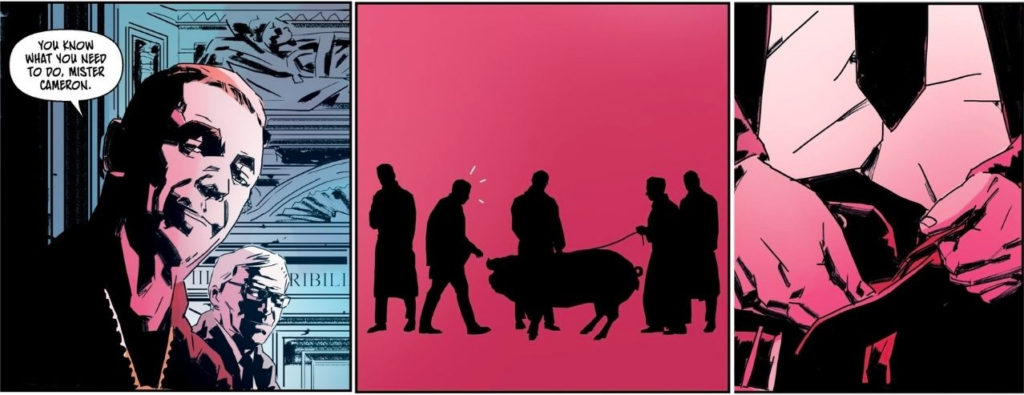
Wyrd, the comic was very interesting, but Wyrd, the TV series, could be incredibly exciting. Count me in.
Supergirl: Woman of Tomorrow (Tom King and Bilquis Evely)
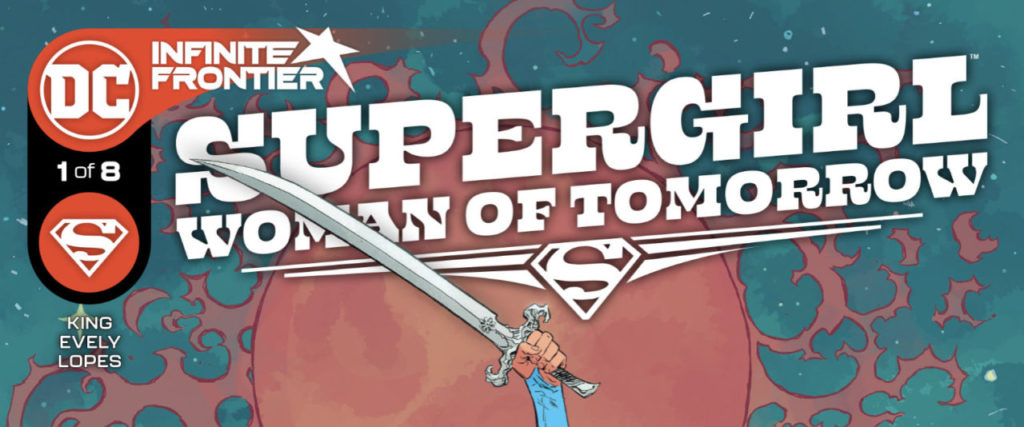
Let me start by saying that I am utterly besotted with Bilquis Evely’s work. I mean, just look at this splash page…
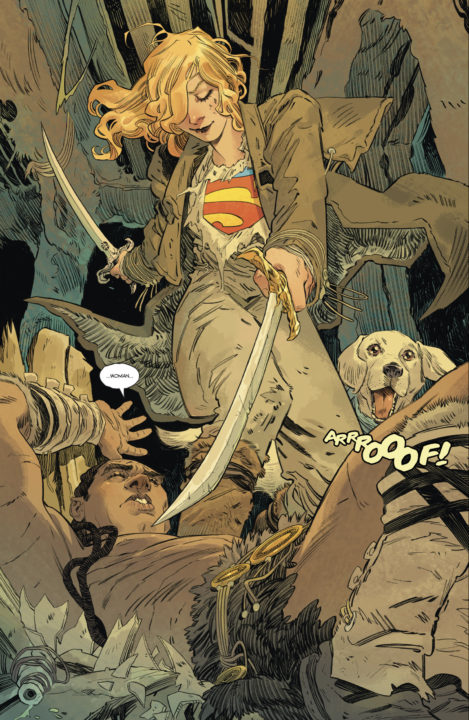
Her thin and fluid linework is absolutely stunning. There is such dynamism in the way she draws your eye along that sword, up Kara’s arm, and to that iconic “S.” It is such a potent reveal and a fantastic hero moment. So much of the world building in this limited series is a product of Evely’s eye. There is grandeur here, be it in the Wild West vistas of the alien world on which this story takes place, or even in the claustrophobia of a seedy tavern. The detail is simply mesmerizing, and all of it is used to great effect in fleshing out a setting that is both familiar and fantastical.
Supergirl: Woman of Tomorrow begins by taking the iconic character away from everything she knows. Here, Kara Zor-El is celebrating being 21, powerless on an alien planet with a red sun, and far away from her cousin’s overwhelming presence. Tom King isn’t trying to humanize Supergirl by stripping away her powers. Unlike Superman, Kara isn’t trying to find a way to better relate to humanity. She’s just trying to escape. All she wants to do is get drunk before returning to the weighty responsibilities that await her back on Earth.
Kara’s plans, however, are waylaid by a young woman on a mission. Her name is Ruthye and she is looking for a vicious mercenary who she wants to hire to kill the man responsible for her father’s death. Kara refuses the young woman at first, but gets pulled into her quest for revenge when the both of them are suddenly attacked.
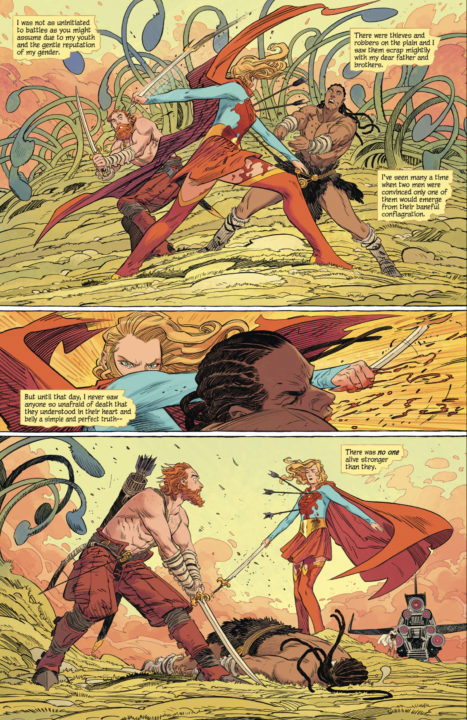
The set-up to this story feels like something we’ve seen before. It is, after all, standard fare in many a western, only here, it’s Supergirl who is the mysterious stranger, the drifter who needs to rediscover her reason for being and reconnect with her previously heroic self. Ruthye too is a well worn archetype. She is the unexpected sidekick, tenacious but naive, whose loss of innocence and plight serves as a catalyst for our protagonist to reevaluate her sense of self.
That familiarity, however, is merely a device used to give this comic an easy access point. It is the kickoff point for a much bigger story, with much higher stakes. (No spoilers here, but you’ll understand what I mean when you read the last few pages of Issue #1.) Even if you’ve never read a Supergirl story before, there is a sense that this is a story that has always been there, just waiting to be told.
Supergirl: Woman of Tomorrow is narrated by Ruthye, whose incredible opening monologue in the first issue lets us know that this is as much her story as it is Supergirl’s. Telling a superhero story through the eyes of the everyman (or woman as the case may be) is a tried and tested comic book trope, but one that Tom King employs to great effect in this narrative. He takes inspiration from any number of westerns (most notably True Grit), and swashbuckling tales of swords and sorcery (think Conan the Barbarian and Red Sonja), merging them to create an epic sci-fi fantasy oater.
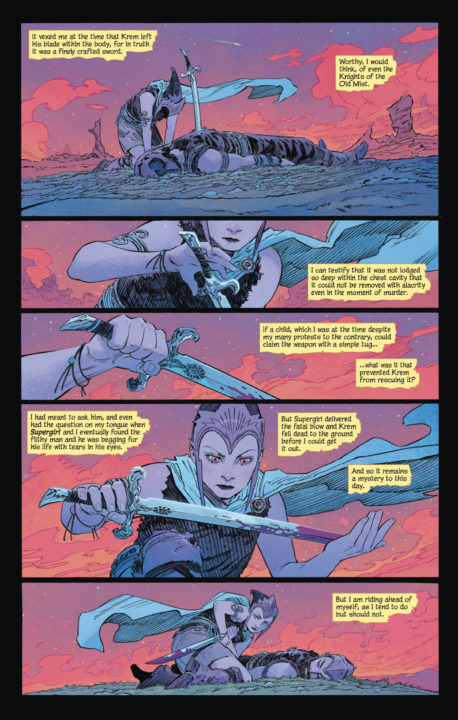
I love it when writers take superheroes and transpose them onto other genres. I love the contrast here between science fiction and high fantasy, and how King works within its strictures, and utilizes its methodology, in order to tell this particular version of the hero’s journey.
Since her first appearance in August 1958, Supergirl’s story has always been told in reference to, and as a reflection of, her far more famous cousin. Supergirl: Woman of Tomorrow is unique in that King extricates the character from her established mythology, and reframes her in a new light. Ruthye isn’t aware of the baggage that comes with the “S,” the cape, and the costume. So when she bestows a sort of mythic status upon Supergirl, she does so entirely on faith, and purely because she believes in her.
What this does is allow us to rediscover who Kara Zor-El is. Not just as Supergirl. Or as Superman’s cousin. But as a person, in her own right, and on her own terms.
Now I don’t know about you, but that’s something that I find incredibly exciting.



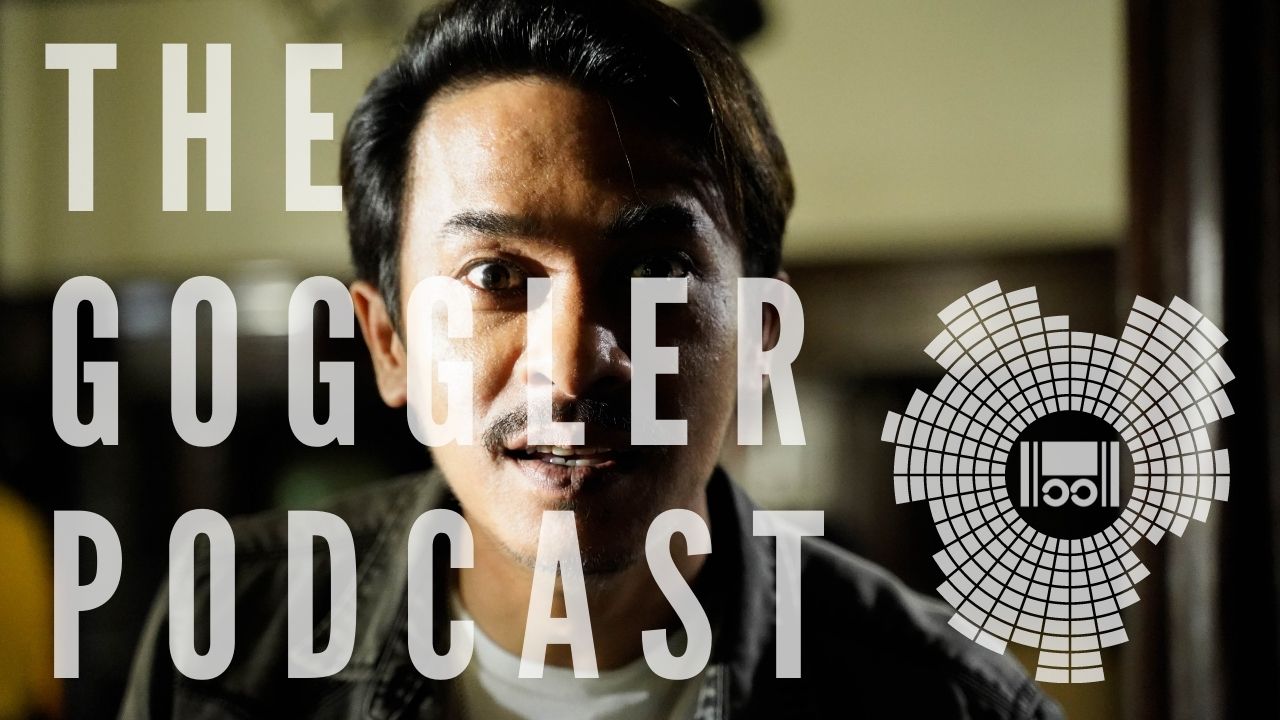

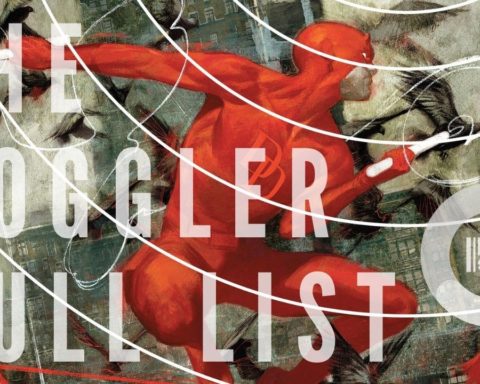



Follow Us